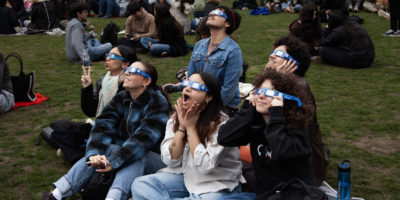By Jordan Heath-Rawlings
Last Sept. 11, most of us were concerned about one thing and one thing only. Author Salman Rushdie, however, had something else on his mind.
Was he facing more trouble over one of his novels? Again?
While everyone was glued to CNN, Rushdie was not only fearing over public reaction to his latest novel, Fury.
It’s date of publication: Sept. 11, 2001.
“[Fury] is a satirical look at contemporary New York that changed into a very sentimental look at New York … because of what happened last year,” Rushdie told a sold-out crowd at the Ryerson Theatre Friday night. The author explained how easily geopolitics can influence popular perception of works of art.
“I wasn’t sure how it would go over,” he said. “And I was planning to come here [last year] to talk about it, but I couldn’t [after Sept. 11].”
The critically acclaimed author’s earlier novel, The Satanic Verses, enraged much of the Muslim world and prompted Islamic mullahs in Iran to place a fatwa (death sentence) on his head. Given his history with the religion, it’s easy to understand why Rushdie feared for his life in the weeks following the terrorist attacks.
In the following days, it was decided he should not continue with his book tour, including a scheduled stop at Ryerson last September.
“I’d like to thank Ryerson for not cancelling the contract,” said the evening’s MC in his introduction, to applause from a captive audience.
Rushdie read from Fury, a highly descriptive novel that paints an almost quaint portrait of a New York summer: Easy profanity flows from the lips of street people while hot dog vendors and other typically Big Apple characters bake in the August heat.
The crowd are it up, fondly applauding the absurdity of Rushdie’s pre=Sept. 11 New York atmosphere and laughing at every shot the novel takes at Western culture’s penchant for overconsumption — one of Fury’s recurring themes.
Rushdie also read selections from his latest non-fiction work, Step Across This Line, a collection of his stories, articles and ramblings from the last 10 years.
The prose in Line is much more active than Fury, and Rushdie was able to better engage the crowd with its jaunty, slightly sarcastic rhythm. The biggest hit with the audience was Rushdie’s snarling reading of a short, Dr. Seuss-inspired poem called How the Grinch Stole America which he wrote after the chad-counting affair that was the 2000 U.S. presidential election:
“The whole thing depended on circles of air. Not to mention the half-holes, and holes that weren’t there.”
Step Across This Line also includes articles Rushdie wrote for various publications after the attacks, and he shared a rather dark article he wrote for The New Yorker.
“New York, in our time, is the beating heart of the world,” Rushdie told the crowd, explaining why both Fury and much of Line focus on life and events in the city where he now resides.
Later, while being interviewed onstage by former Ontario premier Bob Rae, Rushdie confessed that his fears over how Fury would be perceived quickly disappeared.
He told the crowd that he’s come to look on the day before the terrorist attacks — just a regular working day for the author — as one of his fondest memories, and that for many readers, Fury has come to embody that recollection.
“It’s become Sept. 10,” he said. “It was never intended to become a memorial to a lost city, but that’s very much what readers have taken from it.”









Leave a Reply